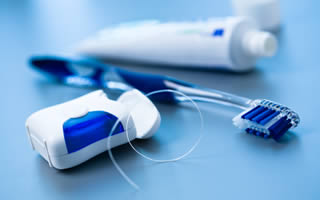The Importance Of Interdental Cleaning

Neglecting to clean between your teeth can have unfortunate results.
You will most likely have read in some of our previous blogs, that only around 20% of the UK population uses dental floss. Floss is specifically used to clean between the teeth and around the gum line in that area. People that rely on brushing alone are unlikely to be cleaning effectively in this area and may suffer the consequences of neglecting to do so.
In this blog, we are going to look at some of the problems that can occur if you fail to clean this area, along with some tips on how our Cygnet Dental Practice patients can come up to speed.
Tooth decay
Most of you will be aware that there are times that food becomes trapped between our teeth. We probably pick out the larger pieces with our fingers or a tooth pick, but this is not an effective way to remove smaller food particles. Even the smallest piece of food will eventually break down and provide food for bacteria. The bacteria then produce acids that attack the tooth enamel. Eventually, the enamel is likely to be damaged sufficiently for bacteria to enter the softer and more vulnerable inner parts of the tooth and cavities will form. Toothache will very likely follow and you will need to have the tooth filled at our highly-rated Wickford dentists, or a crown attached in more significant cases.
Gum disease
In a similar way to how bacteria attack the enamel on our teeth, they can also attack the soft tissue of the gums. This can lead to the gums becoming inflamed, sore and painful. They may also bleed when you brush your teeth. Although these are unpleasant symptoms, the more serious issues start when the bacteria not only infect the gums but start to attack the tooth root and surrounding bone tissue. As it does this, the bone gradually becomes damaged and starts to degrade and lose its hold on the tooth root. This causes the tooth to become loose and wobbly and may eventually even fall out.
Halitosis
Food that gets trapped between the teeth will eventually start to rot and your breath will start to smell. This isn’t the only source of unpleasant odours that can emanate from your mouth though if you suffer from gum disease. As the bacteria feeds on the trapped food particles, they expel gases and it is largely these that cause the foul smell on your breath that can cause people to quickly stand a bit further back than normal when you are speaking to them.
Receding gums
Gum recession is another common side effect of having gum disease. As the gums recede, the roots of the teeth can start to become exposed. This part of the tooth is less well protected by the enamel which protects the rest of the tooth and decay and cavities are therefore more likely if gum recession happens.
General health issues
Increasingly, gum disease is being linked with general health issues. These include the likes of heart disease, diabetes, arthritis and Alzheimer’s amongst others. It is thought that this is due to bacteria from the infected gums entering the bloodstream and leading to problems. Given the amount of research indicating potentially serious illnesses, it makes sense to take a little time cleaning the areas between your teeth.
Improving your interdental care
So, what can you do to clean these tricky to reach areas? The first thing to say is that you should keep cleaning your teeth well. All areas of your teeth are important and brushing your teeth is the bedrock of this.
In order to clean between the teeth, dental floss is the most effective solution available. It is cheap and effective and there really is no reason why most people can’t use it. For those that genuinely can’t, such as people with certain mobility issues or severe arthritis, there are alternatives available such as water flossers. These are generally not as effective as floss though, so we strongly recommend that you use it where you can.
You should also make sure to see our friendly hygienist for a scale and polish procedure. This is an important step in the prevention of gum disease. The non-invasive procedure includes the removal of hardened bacteria known as tartar or calculus. This forms a rough surface which attracts yet more bacteria. If you wish, the hygienist will also be able to demonstrate how to use floss correctly. If you consider it tricky to do, a short demonstration will put you on the right track.
For more advice on interdental care or to book an appointment with the hygienist at our Wickford practice, please call the Cygnet Dental Practice on 01268 733078.
